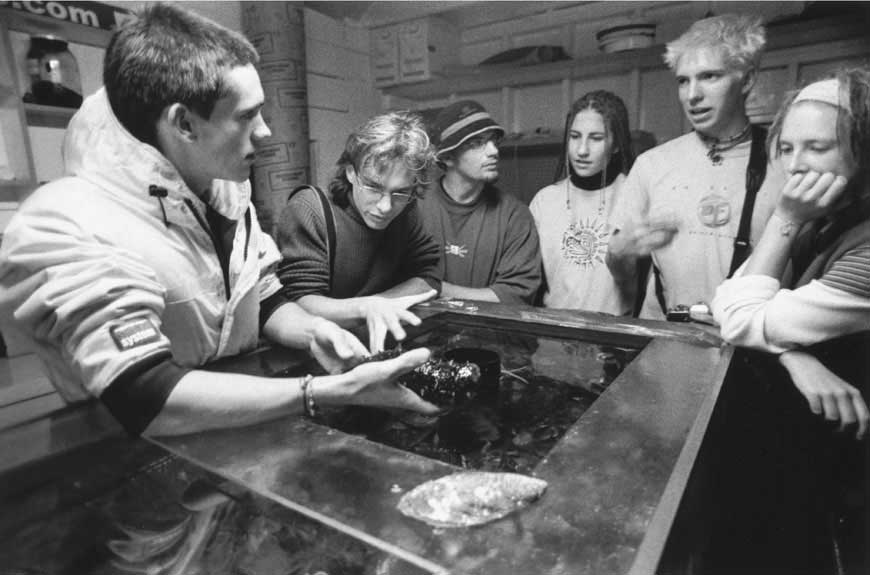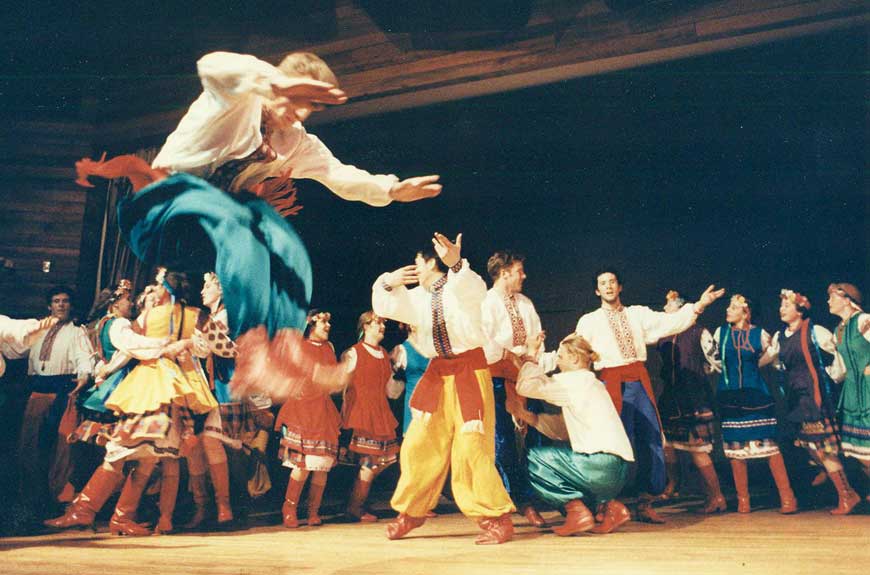On this page
History of Pearson College UWC
Lester B. Pearson, Nobel Peace Laureate (awarded in 1957) and former Prime Minister of Canada, was the driving force behind the founding of Pearson College UWC. After retiring from public life, Mr. Pearson became interested in the United World Colleges (now UWC) movement. At the time there was only one UWC school — the College of the Atlantic in Wales, established in 1962.
Mr. Pearson visited the College of the Atlantic in 1969 and met with students and faculty and came away convinced that there must be more such colleges around the world and, in particular, one on Canada’s west coast. His vision:
“Students will be welcomed without regard to race, religion or politics and we intend to establish scholarships so that the students who attend the College will be from all levels of society and will be genuine representatives of their own peoples. This system … could become a revolutionary force in international education.”
Mr. Pearson became Honourary Chairman of a committee formed to build what was to be known as the College of the Pacific. He worked tirelessly to get the project underway but unfortunately passed away in December 1972.
The mantle of this major initiative was taken up by many friends and colleagues of Mr. Pearson. Soon after his death it was decided that the College would be renamed Lester B. Pearson College of the Pacific as a living memorial to his vision.
The Hon. John L. Nichol, CC, was chosen as Chairman of the Board of Trustees and a major fundraising effort began, with over $4 million raised — 83% from individuals, corporations and foundations from across Canada and around the world, and the remaining 17% from governments. On Sep. 25, 1973, construction began on the campus.
Pearson College UWC was founded in 1974 as Lester B. Pearson United World College of the Pacific (Canada).
Over the next year, Jack Matthews, Founding Director of the College, recruited a faculty of men and women from around the globe, and on Sep. 25, 1974, the first 100 students arrived. Since then, up to 200 students – aged 16 to 19 — have attended each year.
To date, more than 4,200 students have graduated from Pearson College UWC, going onto further education and working in a variety of professions across the globe. No matter what they do, Pearson alumni are dedicated to making change happen in diverse and powerful ways. They share a determination to make a difference and work in their communities as a positive force for peace and progress.
As a non-profit educational institution, the College relies upon the generosity of supportive individuals, alumni, corporations, foundations, together with select governments and supporters of the UWC movement, to help make its extraordinary education available.
History of UWC
In an age when many major issues require global solutions, the UWC movement aims to promote, through education and exchange, a greater understanding between the peoples of the world. This network includes 18 colleges and schools around the world coordinated by the UWC International Board.
The UWC movement was conceived in the 1950s at the height of the Cold War. Kurt Hahn, a noted educator forced to flee Germany during World War II, believed that much could be done to overcome religious, cultural and racial misunderstanding and avoid conflict if young people from all over the world could be brought together. He believed that, while youth aged 16 to 18 are grounded in their own cultures, they are still impressionable enough to learn from each other. Working with RAF Air Marshal Lawrence Darvall and Rear-Admiral Desmond Hoare, Hahn established a new concept of education that would become a powerful force for peace. The first UWC—College of the Atlantic in Wales—opened in 1962, with the second, Lester B. Pearson College of the Pacific (Pearson College UWC), following in 1974.
Today, more than 60,000 students from over 180 countries have studied at UWC schools and colleges and there are about 150 national committees supporting students interested in becoming part of this movement. The 18 colleges are not identical, but share many characteristics as well as the UWC mission and values. Students, faculty and staff from many different nationalities and a wide variety of backgrounds form vibrant and enthusiastic communities as they live and work together.
UWC played a major role in developing and supporting the International Baccalaureate, which provides both the academic program for the colleges and the international university entry examinations taken by graduating students. UWC places strong emphasis on community service activities, in the belief that understanding between peoples cannot be created in the classroom alone.
By offering an educational experience based on shared learning, collaboration and understanding, a UWC education helps students act as champions of peace and progress. In the turbulent world of the 21st century, UWC’s aims and objectives are as relevant today as they were in 1962 – perhaps even more so.
UWC timeline
1960s | Birth of the UWC Movement
1962 – UWC Atlantic College opens in South Wales and is hailed by The Times as “the most exciting experiment in education since the Second World War.”
1967 – Lord Mountbatten becomes President of the organization and the movement becomes “United World Colleges.
1970s | Gaining Traction
Increasing numbers of national committees are established to promote UWC within their own countries and to select students for the colleges and schools.
1971 – The Singapore International School officially opens as an associate member of UWC.
1974 – Pearson College UWC opens. Lester B. Pearson, former Canadian Prime Minister and Nobel Peace Prize Laureate, had been the inspiration behind the founding of the College.
1975 – The Singapore International School becomes a full member of the UWC movement and is officially renamed UWC South East Asia.
1978 – HRH The Prince of Wales becomes president of UWC.
1980s | The Movement is Growing
1981 – Waterford Kamhlaba School in Swaziland, founded in 1963 as a multiracial school in opposition to South Africa’s apartheid policies, becomes Waterford KaMhlaba UWC of Southern Africa.
1982 – UWC-USA in New Mexico, USA, and UWC Adriatic, near Trieste in Italy both open.
1988 – HRH the Prince of Wales and agronomist Dr. Luis Marcano Coello play a key role in the establishment of a College in Venezuela, Simón Bolívar UWC of Agriculture.
1990s | Short Courses and more Colleges
UWC develops short courses as a means of providing further opportunities for young people to share the UWC experience.
1992 – Li Po Chun UWC of Hong Kong opens.
1995 – HM Queen Noor of Jordan and Nelson Mandela become joint presidents. UWC Red Cross Nordic in Norway opens, a joint venture with the Red Cross/Red Crescent organization and the eight Nordic governments.
1997 – UWC Mahindra College in Pune, India, opens.
1999 – Nelson Mandela becomes honorary president of UWC.
2000s | A Truly Global Movement
2006 – UWC Costa Rica, formerly the Costa Rica SOS Hermann Gmeiner International College joins UWC, and UWC in Mostar, Bosnia and Herzegovina opens.
2009 – UWC Maastricht joins UWC, merging two existing international schools, International School Maastricht, and the International Primary School Joppenhof.
2010s | Continued Growth
2012 – Simón Bolívar UWC of Agriculture closes following actions taken by the Venezuelan government to make it a public university.
2014 – UWC Diljan in Armenia, and UWC Robert Bosch College in Germany, open. Pearson College UWC celebrates its 40th anniversary.
2015 – UWC Changsu China opens.
2016 – UWC Thailand opens.
2017 – UWC ISAK Japan opens.
Celebrating the 60th anniversary of Lester B. Pearson being awarded with the Nobel Peace Prize
2018 – Pearson completes several campus infrastructure projects, including a full top-to-bottom renovation of McLaughlin House student residence.
“Renew & Re-found: A Campaign for Pearson College UWC” fundraising initiative gets underway.
2019 – UWC East Africa (UWCEA) in Tanzania officially becomes the 18th UWC school and the second on the African continent.
2020s | Milestones
2022-23 – Li Po Chun United World College of Hong Kong celebrates its 30th anniversary and UWC Hong Kong Committee celebrates 50 years of selecting students for UWC.
60th Anniversary of UWC Atlantic College, the birthplace of the UWC movement.
Visual History
Goal
This archival project tells the story of the College’s founding and its founder, Lester B. Pearson and the impact this had on Canada as a peacekeeping nation as Canada celebrate 150 years in 2017, which also marks the 60th anniversary of Lester B Pearson being awarded the Nobel Peace Prize for his involvement in defusing the 1956 Suez Crisis.
The project
This project involved key members of the Pearson community from its founding years through to the present. The creation of a digital archive, while a considerable task, benefited significantly from the skills and memories of Marg McAvity, the college’s first and longest-serving librarian, as well as Judy Scott who was the Assistant to the College Director for 30 years. Working with librarian, alumna and resident Dani McArthur (YR6/1981, Canada), library-support students, volunteers including alumnus Adrian Lee (YR1/1976, Canada) and Monique Grenier, an intern on placement from the Masters in Archival Studies program at the University of British Columbia, the Pearson collection and the vast store of archives now housed in the library have been sorted, digitalized and categorized.
This material will be used in the creation of a mobile digital display celebrating Lester B. Pearson and the realization of his dream. This display will then be housed in the Pearson Room on campus, with the intention for ti to be also be available on loan to other libraries, schools and public centers throughout Victoria and the surrounding areas. The digital display will also be housed online and will be available for downloading onto personal devices. In this way, from its inception to its eventual use by both institutions and individuals, this educational display created to commemorate the legacy of Lester B. Pearson is available locally, nationally and internationally.
Acknowledgement
This initiative was made possible by the Community Fund for Canada’s 150th, a collaboration between the Victoria Foundation, the Government of Canada, and extraordinary leaders from coast to coast to coast.
Cette initiative est rendue possible grâce au Fonds communautaire pour le 150e anniversaire du Canada, qui est une collaboration entre le Victoria Foundation, les fondations communautaires canadiennes, le gouvernement du Canada et des leaders extraordinaires de l’Atlantique au Pacifique à l’Arctique.







































